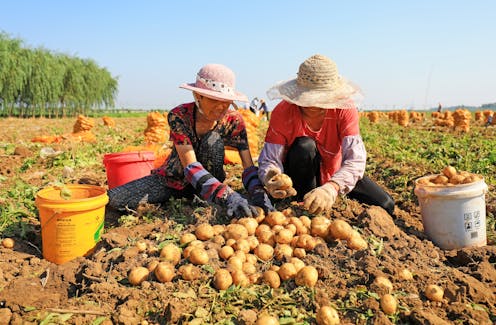
How do you get a country to change its national diet? That’s what China has been trying by introducing potato as a staple as part of an effort to improve food security. In this episode of The Conversation Weekly, we talk to three experts about why countries need to shift what their citizens eat, and what the optimum diet for our planet might be.
Chinese farmers plant the largest amount of potatoes in the world, and the country produces about 20% of the global potato output. But while fresh potatoes are a traditional part of the Chinese national diet, they’re viewed as a vegetable rather than as a staple, and China’s per capita consumption of potato is below the global average.
In 2015, the Chinese government decided to try and change that. It introduced a policy to promote the potato as the country’s fourth staple alongside rice, wheat and maize. As Xiaobo Xue Romeiko, a professor at the University at Albany, State University of New York in the US explains, behind the strategy lay concerns over food security and the availability of arable land. “Potato is more versatile and it can be grown in marginal land which is not suitable as our arable land,” she says.
Potatoes are also less energy intensive to grow and, according to her research, have the potential to reduce greenhouse gas emissions from food production in China, particularly if it introduces varieties with higher yields.
Other countries may need to follow China’s lead. As pressures mount on the global food system thanks to climate change, the COVID-19 pandemic and Russia’s invasion of Ukraine, food security has become a central issue for many more governments. “At the moment the food system really is under the highest stress,” says Paul Behrens, associate professor in environmental change at Leiden University in the Netherlands. In 2022, the UN’s food price index, which measures monthly changes in international prices of a basket of food commodities, has hit record highs.
Behrens says that many of the responses from governments so far have been short-sighted. “I don’t see an awful lot of governments considering the fundamental system transitions that are needed to really secure food systems and make them more resilient to future climatic change.” He argues that countries need to radically change their nations’ diets, specifically in high-income nations where the over-consumption of meat is driving much of the interlocking crisis.
So what would an optimum diet that is nutritious and sticks within planetary boundaries actually look like? A group of researchers put their heads together to find out and came up with the EAT-Lancet diet, also known as the planetary health diet.
One of them was Marco Springman, a professor of climate change food systems and health at the London School of Hygiene and Tropical Medicine in the UK, and also a senior researcher at the University of Oxford. “You shouldn’t have more than one serving of red meat per week. Not more than two servings of poultry per week, not more than two servings of fish per week. And if you have dairy, not more than one serving per day,” he says. Counting that up, that means being vegetarian or vegan on two days a week.
To find out more about where responsibility lies to shift national diets, listen to the full episode on The Conversation Weekly podcast.
This episode was produced by Mend Mariwany and Katie Flood, with sound design by Eloise Stevens. It was written by Mend Mariwany. Gemma Ware is the show’s executive producer. Our theme music is by Neeta Sarl.
You can find us on Twitter @TC_Audio, on Instagram at theconversationdotcom or via email. You can also sign up to The Conversation’s free daily email here. A transcript of this episode will be available soon.
Listen to The Conversation Weekly via any of the apps listed above, download it directly via our RSS feed, or find out how else to listen here.
Marco Springmann receives funding from The Wellcome Trust.
Paul Behrens and Xiaobo Xue Romeiko do not work for, consult, own shares in or receive funding from any company or organisation that would benefit from this article, and have disclosed no relevant affiliations beyond their academic appointments.
This article was originally published on The Conversation. Read the original article.







